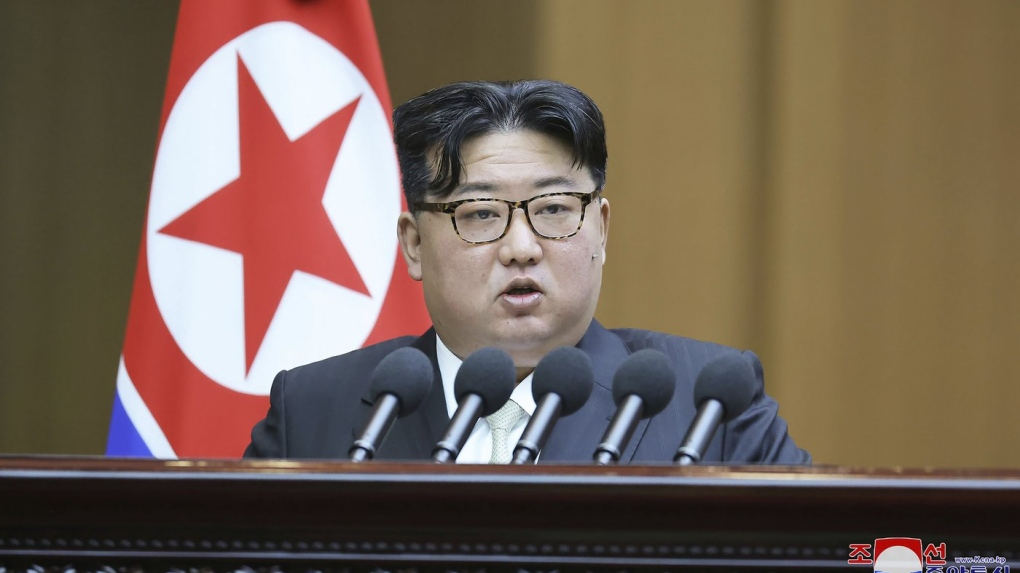
In an image released by the North Korean government, Kim Jong Un, the leader of North Korea, addresses the Supreme People's Assembly in Pyongyang on Monday, January 15, 2024. The photograph was provided by the Korean Central News Agency/Korea News Service via AP.
In a significant shift, North Korean leader Kim Jong-un has announced that his country will abandon efforts for reconciliation with South Korea and is urging the rewriting of North Korea's constitution to remove the notion of shared statehood between the two nations. This departure from decades-long aspirations for peaceful unification comes amid heightened tensions, marked by increased weapons development by Kim and intensified military exercises between South Korea and the United States.
Experts suggest that Kim's move may be aimed at diminishing South Korea's influence in regional security affairs and signalling a preference for direct engagement with the United States on the nuclear standoff. The strained relations have been exacerbated by disagreements over U.S.-led sanctions against North Korea's expanding nuclear weapons program.
By designating the South as a permanent adversary, rather than a potential partner for reconciliation, Kim seeks to bolster the credibility of his escalatory nuclear doctrine, allowing preemptive nuclear attacks if the North perceives a threat to its leadership. UN Secretary-General António Guterres has expressed concern about the reduction in contacts, emphasizing the importance of diplomatic engagement for sustainable peace on the Korean Peninsula.
In addition to these diplomatic shifts, North Korea has abolished key government agencies responsible for managing relations with South Korea. The move was announced during a session of the rubber-stamp parliament, where it was declared that the two Koreas are in an "acute confrontation." The assembly further stated that considering the South as a diplomatic partner would be a serious mistake.
Kim blamed South Korea and the United States for escalating tensions, citing joint military exercises, U.S. military deployments, and trilateral security cooperation with Japan as factors contributing to a dangerous war-risk zone on the Korean Peninsula. Kim has actively sought partnerships with Moscow and Beijing to break diplomatic isolation and enhance leverage against Washington.
The North Korean leader has called for the rewriting of the country's constitution to define South Korea as the "primary foe and invariable principal enemy." This new constitution would assert North Korea's intent to "occupy, subjugate, and reclaim" South Korea in the event of another war on the peninsula. Kim also ordered the removal of symbols of inter-Korean reconciliation and the elimination of concepts such as 'reunification' from the national history.
South Korean President Yoon Suk Yeol criticized Kim's remarks, describing them as "anti-national and anti-historical." He affirmed the South's firm defence readiness and warned of severe consequences if provoked by the North.
Kim, in his address to the assembly, reiterated that North Korea does not intend to unilaterally start a war but has no intentions to avoid one either. With a growing military nuclear program, he warned of "unimaginable disaster and defeat to the United States" in the event of a nuclear conflict on the Korean Peninsula.
In response to the decision to abolish agencies handling dialogue and cooperation with the South, the North Korean government has pledged to take "practical measures." This move marks a departure from previous efforts at inter-Korean cooperation, with joint economic and tourism projects halted for years due to deteriorating relations over North Korea's nuclear ambitions.
In conclusion, North Korea's abandonment of reconciliation efforts and the push to redefine its relationship with South Korea signals a significant shift in the geopolitical landscape of the Korean Peninsula. The move raises concerns about the potential for heightened tensions and underscores the challenges of achieving diplomatic solutions in the region.















